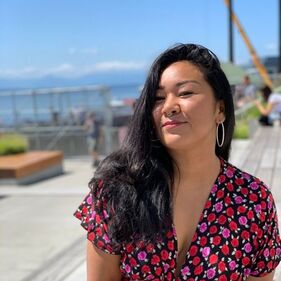|
By Anya Shukla Over the past few years, Sara Porkalob’s name has become synonymous with the Seattle theater scene. Porkalob, it seems, has done it all. She co-founded and wrote intersectional arts criticism for an online publication, DeConstruct; acted and sang in "DRAGON CYCLE," her critically-acclaimed trilogy of solo shows; used art to address issues of racial equity through the City of Seattle; and will soon be performing on Broadway in the 2021 revival of “1776.” Yet despite its varied mediums, Porkalob’s work always intersects with her personal mission of activism: empowering, uplifting, and sharing resources and power with BIPOC communities. Q: I love that you have a clear mission and purpose. When did you first realize that you wanted to empower and uplift BIPOC communities through artwork? A: In my arts education, I had zero exposure to stories that looked like me. When I got my Bachelors of Fine Arts, there were 60 people in the class; eight were people of color. That just felt wrong. After graduating, I had this personal and professional crisis. I had to let myself be angry; I had to recognize how much privilege I had as an American citizen, an able-bodied, cis woman with access to higher education. I realized that I actually did want to be an artist. I want to make theater; I want to make community. I had to let go of some of what my school taught me, and I have to figure out what's important for myself. Q: What is important to you as an artistic leader? A: If I have to compromise the relationships or wellness of my collaborators in order to produce a work of art, then I'm not doing my job. When I was in college, the mission of the director was to be the visionary of a play. I don’t believe in that ideology. I want to be able to look at my team and say, “I trust all of you. Our knowledge, our passion, our collaboration is what will make this play that we're building incredible.” When I'm a person in a position of power, I remind myself before I step in a room that everything I'm going to do is in service to the collective. Sure, I have expertise, but everybody in that room has expertise. This is a community effort. Q: How, to you, does art intersect with racial equity? A: The arts have very unique tools to combat racial inequities—specifically, storytelling. Stories teach us about connection and compassion and liberation, my intersectional identity, other people's intersectional identity. Art encapsulates our unique human experience in many different forms and mediums; art is a form of cultural documentation. And our cultural experience is racial. Q: Your role with the City of Seattle involved storytelling: you interviewed BIPOC people in the nonprofit arts sector and turned their stories into plays, thereby allowing government employees to learn more about race as it intersects with arts and culture. What did you learn through that experience? A: It was very clear early on that this narrative we have nationally of our city—that Seattle's this liberal, progressive bubble—is not true. This wave of social awakening to oppression and injustice is a cultural symptom that all of us must reckon with, regardless of race. There's no one way to fix this, I realized. So I'm just going to let go of that idea. As a society, we've evolved so much to think in the binary, but I'm going to remain open because there's always so much more to learn, and there's so much to unlearn. Q: How do you remain open during your personal artistic process? A: In every project, I deal with fear: is what I'm making going to be good or important or meaningful? I have to let go of the worry of not doing it right the first time. We have to embrace the “artistic process” as a series of failures—learning experiences—rather than a linear model automatically leading to success if we work hard enough. Once we embrace “process” as a holistic, communal experience, we can start to create art that's in relationship to our environment, rather than a manifestation of our ego. After all, I'm not making art in a vacuum. I'm making art in relation to people. Q: What advice do you have for teen artists of color? A: In college, when I had my eyes opened to racial and social injustice, that feeling of isolation and loneliness almost kept me from doing what I love. You’re not alone. There are so many resources, so many mentors, so many books. You just have to go out and try to find them. This interview has been edited and condensed for clarity.
0 Comments
Your comment will be posted after it is approved.
Leave a Reply. |
Archives
February 2023
Categories
All
|

 RSS Feed
RSS Feed